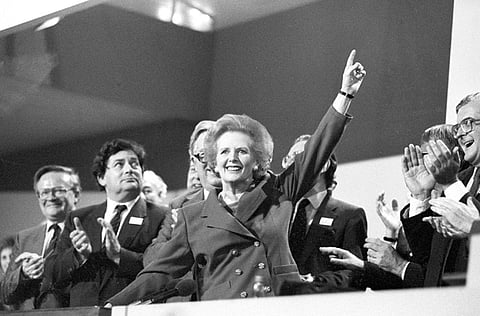Australian minister: Margaret Thatcher held racist views
Bob Carr says late British ex-premier Margaret Thatcher warned of 'Asian migrants taking over'

London: Margaret Thatcher has been accused by the Australian foreign minister of having held “unabashedly racist” views after he revealed that the late former British prime minister had warned him of the challenge posed by immigration from Asia.
Bob Carr, who served as premier of New South Wales between 1995 and 2005, said that Thatcher pleaded with him to ensure Sydney did not “end up like Fiji” where citizens of Indian heritage formed a majority until a coup in 1987.
Carr, whose wife is of Malaysian origin, spoke of his surprise at Thatcher’s remarks. The senator told the Lateline programme on ABC TV: “I recall one conversation I had with her in her retirement where she said something that was unabashedly racist, where she warned Australia, talking to me with Helena [his wife] standing not far away, against Asian immigration, saying that if we allowed too much of it we’d see the natives of the land, the European settlers, overtaken by migrants.”
Carr expressed astonishment when Thatcher drew an analogy with Fiji, where the Indo-Fijian community formed a majority of the population in 1970 when it achieved independence from Britain. The community, descendants of labourers who travelled to the former British colony to work on sugar plantations in the late 19th century, has fallen to just over 38 per cent in the last two decades after a 1987 coup. In 2000 Mahendra Chaudhry, the first Indo-Fijian prime minister, was taken hostage in another coup.
Carr said: “I was astonished. Helena fortunately was out of earshot. I remember one thing she [Thatcher] said as part of that conversation. She said: ‘You will end up like Fiji. I like Sydney but you can’t allow the [Asian] migrants to take over otherwise you will end up like Fiji where the Indian migrants have taken over.”
The foreign minister added: “I was so astonished I don’t think I could think of an appropriate reply. I think we moved on to other subjects pretty quickly.”
Carr, a Labour senator who was appointed foreign minister after the resignation of the former prime minister Kevin Rudd last year, made clear that he still respected Thatcher on the grounds that she challenged the centre-left to modernise.
He said: “She produced a realignment of politics. She forced my side of politics, the social democrat parties, to think more deeply about the role and function of the state, of the public sector. [She] forced Labour parties around the world to consider whether government could remotely pretend to be the answer to many of the problems it was assumed it could be. I also think she was right in joining Reagan and denouncing the old Soviet Union as an evil dictatorship.”
Carr’s remarks contrasted with warm praise for Thatcher from Julia Gillard, Australia’s British-born and first woman prime minister. Speaking in Beijing, she said: “Her service as the first female prime minister of the United Kingdom was a history-making achievement. Her strength of conviction was recognised by her closest supporters and her strongest opponents.”



